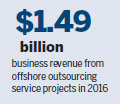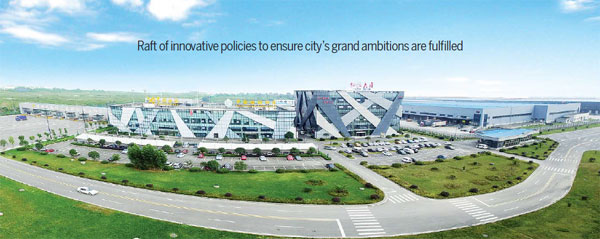Service industry at the heart of new trade zone
Raft of innovative policies to ensure city's grand ambitions are fulfilled
Chengdu, the capital of Sichuan province, is committed to promoting innovation in the trade services industry to support construction of the China (Sichuan) Pilot Free Trade Zone.
The first combined bill of lading for the Chengdu-Europe Express Railway was issued in the FTZ to a Dutch exporter on April 6, only five days after the establishment of the zone. The document allows foreign exporters to receive their payments before buyers receive their goods.
The Chengdu-Europe Express Rail service, which became operational in April 2013, is the fastest and most frequently used cargo railway route linking the city to European countries as part of China's Belt and Road Initiative.
According to an overall plan released by the State Council on March 31, the FTZ must promote the development of an international multimodal transport model, launch pilot projects to issue combined bills of lading with guarantee functions and explore a multimodal transport model that requires only one supporting document.
The first combined bill of lading marks a significant breakthrough in the FTZ's innovation in the trade in the services sector, according to Chengdu authorities.

Trade in services
Chengdu's trade in services industry has reported significant growth over the past few years, due to strong government support and market demand.
Lyu Yuan, director of the trade in services department of the Chengdu Commission of Commerce, said that the city's average year-on-year growth of added value in the service sector reached 10.3 percent during the 12th Five-Year Plan (2011-15) period, surpassing the national average by two percentage points.
In 2015, Chengdu's added value in the service sector reached 570.4 billion yuan ($83.2 billion), ranking fourth among sub-provincial cities in China. The city is strongly positioned in tourism, computing and information, architectural design services and culture and entertainment sectors in China.
"The trade in the services industry has been growing rapidly in Chengdu in recent years," Lyu said. "The city is taking leading role in the trade in the services sector in central and west China."
Chengdu's trade in services businesses mainly focus on four areas: aircraft maintenance and repairing, service outsourcing, technology services and culture services.
Last year, local businesses reported $1.49 billion in revenue from offshore outsourcing service projects. The city established 13 public service platforms to support 100 offshore outsourcing projects in 2016.
Chengdu Hi-Tech Industrial Development Zone's industrial throughput value of online gaming reached 10 billion yuan in 2016, an increase of more than 40 percent year-on-year.
The local government has paid much attention to promoting development of the trade in services industry. Chengdu Commission of Commerce partnered with the city branch of the People's Bank of China to establish the Chengdu Financial Service Outsourcing Association in 2015. The association's aim is to promote interaction between financial institutions and software information enterprises.
Last year, cultural trade-related seminars were also arranged by Chengdu governments to help cultural businesses better understand the concept of service trading.
By the end of 2016, seven cultural bases were established in Chengdu and 30 companies were recognized as key cultural trade businesses. These actions promoted development of local intangible culture heritage such as traditional handicrafts, Sichuan Opera, folk music and dance.
Chengdu was listed as a national-level service trading innovation pilot zone in February 2016 by the State Council, the only such pilot zone in western China. The city is responsible for exploring innovative development in eight areas, including service trade management systems and upgrading of development models.
Chengdu's role in supporting FTZ development
The 120-square-kilometer FTZ, launched on April 1, covers Chengdu Tianfu New Area, Chengdu Qingbaijiang International Railway Port and part of Luzhou city. About 100 sq km of the core and supporting areas of the FTZ are in Chengdu.
The overall plan lays out 159 reform tasks covering 24 areas of the FTZ. Among those, Chengdu is responsible for 155 tasks.
In the next few years, Chengdu will implement measures such as streamlining and delegating power, strengthening supervision, supporting service and financial innovation and applying preferential policies that are being piloted in other FTZs to support its own FTZ development, according to the plan released by Chengdu Administration China (Sichuan) Pilot Trade Free Zone.
Chengdu Tianfu New Area and Chengdu Qingbaijiang International Railway Port will serve different functions during construction of the FTZ.
Chengdu Tianfu New Area will focus on developing a modern service industry, an advanced manufacturing industry, as well as high technology, airport and port service industries. The region will be a gathering place for modern businesses, a leader in the financial industry, a logistics center and an international aviation hub.
The Qingbaijiang International Railway Port area will focus on cultivating the port service and modern service industries. International merchandise transport, international freight forwarding, vehicle imports, and information, technology and exhibition services will be provided in the region.
The local government will spare no efforts to attract global experts to support its FTZ development.
Chengdu was one of the first cities in China to launch a pilot program for work permits for foreigners under the guidance of the central government. This pilot program is intended to streamline application and administration procedures and processes and to attract more high-level foreign experts to China.
The Chengdu Administration of Foreign Experts Affairs issued the first foreigner's work permit in Sichuan province to a professor from the Southwest Jiaotong University in November 2016, marking the completion of pilot work for the foreigner work process.
tangzhihao@chinadaily.com.cn
|
Authorities in Chengdu explore methods used in the Sichuan FTZ before developing the city's own trade zone. Photos Provided To China Daily |
(China Daily 04/28/2017 page24)















